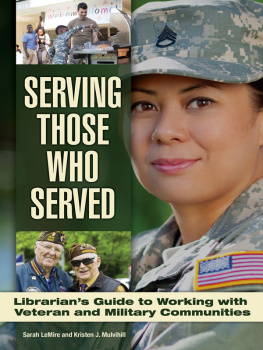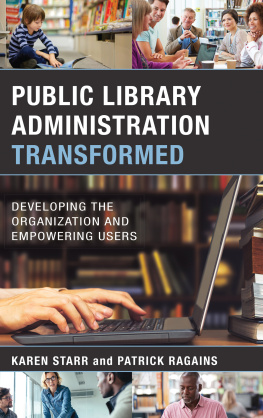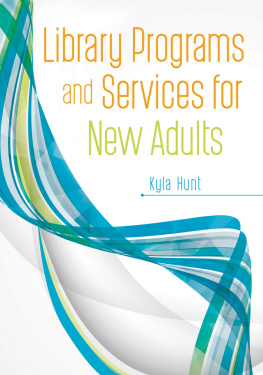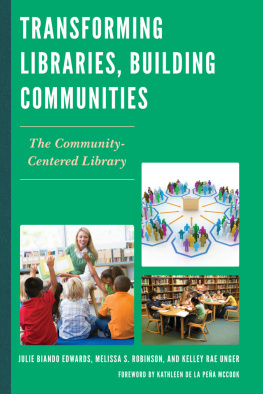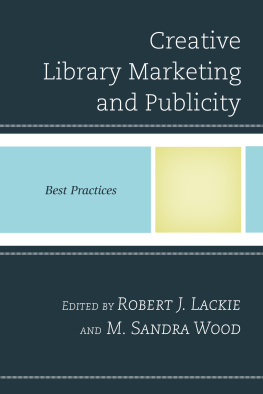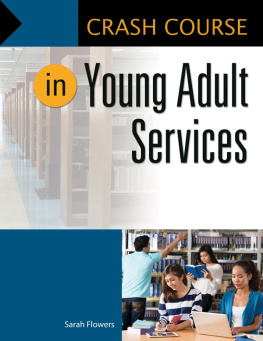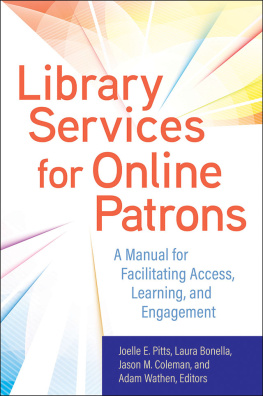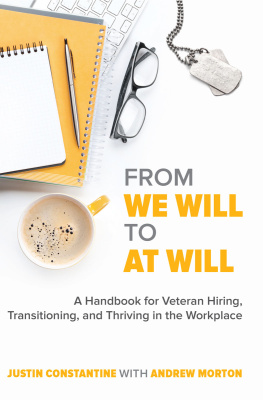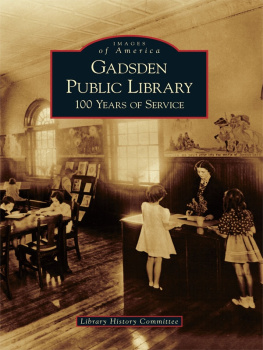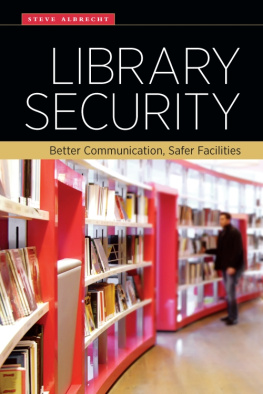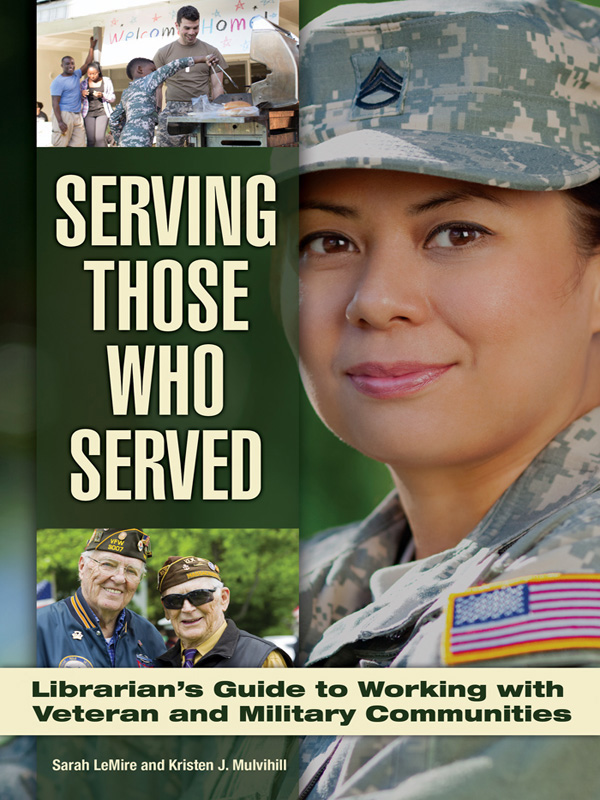Serving Those Who Served
Copyright 2017 Sarah LeMire and Kristen J. Mulvihill
All rights reserved. No part of this publication may be reproduced, stored in a retrieval system, or transmitted, in any form or by any means, electronic, mechanical, photocopying, recording, or otherwise, except for the inclusion of brief quotations in a review, without prior permission in writing from the publisher.
Library of Congress Cataloging-in-Publication Data
Names: LeMire, Sarah, author. | Mulvihill, Kristen J., author.
Title: Serving those who served : librarians guide to working with veteran and military communities / Sarah LeMire and Kristen J. Mulvihill.
Description: Santa Barbara, California : Libraries Unlimited, an imprint of ABC-CLIO, LLC, [2017] | Includes bibliographical references and index.
Identifiers: LCCN 2016039278| ISBN 9781440834325 (hardcopy : acid-free paper) | ISBN 9781440834332 (eBook)
Subjects: LCSH: Libraries and veteransUnited States. | Libraries and soldiersUnited States. | Libraries and families of military personnelUnited States.
Classification: LCC Z711.92.V48 L46 2017 | DDC 027.60973dc23 LC record available at https://lccn.loc.gov/2016039278
ISBN: 978-1-4408-3432-5
EISBN: 978-1-4408-3433-2
212019181712345
This book is also available as an eBook.
Libraries Unlimited
An Imprint of ABC-CLIO, LLC
ABC-CLIO, LLC
130 Cremona Drive, P.O. Box 1911
Santa Barbara, California 93116-1911
www.abc-clio.com
This book is printed on acid-free paper 
Manufactured in the United States of America
To our husbands, for their endless support.

Contents



We would like to thank all of our friends, family, and colleagues who have kindly provided feedback on parts of this book, including Stacey Aldrich, Catherine Blansett, Jim Blansett, Marta Brandes-Miesner, Jacquie Brinkley, Jason Broughton, Chris Brown, Sean Buckner, Dan Cisco, Karen Bosch Cobb, Rob Coppo, Jason Deitch, Michelle Donez, Lise Dyckman, April Evans, Lisa Foster, Margaret Foster, SGM Donald Freeman (Ret.), Harlynne Geisler, Christine Gonzalez, Stephanie Graves, Derek Halling, Susan Hanks, Mark Harryman, John Buzz Kraft, MAJ Nick Long, Patrick MacInerney, Brenda Magente, Hollie May, Kenny Mintz, Sandi Mintz, Lynne Muller-McIntyre, Nellie Moffitt, Marilyn Mulvihill, Patrick Mulvihill, Carol Naegele, Sylvia OHara, Cindy Olney, Frances Rickard, Erin Ropposch, Loriene Roy, Ingrid Ruffin, Lorelei Rutledge, Michelle Simmons, Vera Skop, Cynthia Smith, Mary Somerville, Lorraine Stein, Elizabeth Stevens, Ray Stevens, Robert Stevens, Shelley Stevens, Jennifer Taft, Diane Walden, and Betty Waznis.
Additionally, we would like to thank all of those who have shared their stories and experiences with us, including those who are not named on this page.
A special thank you is included for Sean Buckner, who contributed great time and effort to many aspects of the project, from proofreading to offering advice on how to organize its content.
Finally, wed like to express our gratitude to those who are serving or have served in the military and to those of you who are the family members, spouses, partners, and caregivers of those who serve or have served.


Veterans, service members, and their families are not new to library communities. Librarians have served the veteran and military communities in peacetime and in war, as well as in the transitionary periods between. Library literature as early as the World War II era recognized the need for librarians to adapt their wartime services to focus on helping returning troops readjust to civilian life (Merrill, 1944). However, librarian focus on veterans and service members as a special patron population has not remained consistent over the years. Recently, in the aftermath of the wars in Iraq and Afghanistan, librarians have become increasingly interested in library outreach to and services for the veteran and military communities. Efforts in the last few years include the following:
National library conferences have featured discussions of library outreach to veteran and military-affiliated patrons (e.g., Roy, Mulvihill, Rickard, Taft, & Olney, 2016; Tinoco & Hoppenfeld, 2015; LeMire, 2015; Blansett & Blansett, 2012).
Community-based solutions for veterans and military families are one of the highest priorities of the Institute of Museum and Library Services (IMLS) fiscal year 2017 budget request (Institute of Museum and Library Services, 2016).
ALA sponsored a 2015 diversity research grant, Facilitating the Learning and Academic Performance of Student Veterans (American Library Association, 2015).
Several research articles have been published that begin to delve into the unique characteristics and needs of veterans and service members and how libraries can contribute to their success (e.g., Fawley & Krysak, 2013; Mills, Paladino, & Klentzin, 2015; Taft & Olney, 2014).
IMLS has sponsored projects such as War Ink and Californias Veterans Connect @ the Library program (War Ink, 2014; Veterans Connect @ the Library, 2016).
While the increase in discussion of veteran and military issues suggests that librarians have become open to the idea of treating veterans and service members as a unique patron population, many librarians may not be quite sure where to begin.
This book can help. The authors are librarians as well as Army veterans. Kristen served in the Army as a linguist and paratrooper during the first Gulf War, earning a Meritorious Service Medal by the end of her four-year service. Sarah served in the Army as an Arabic linguist from 2002 to 2007, including a year-long deployment to Iraq. They also have ongoing experience with immediate family members and close friends serving in Iraq and Afghanistan or coping with the transition from military to civilian life. And both authors currently work at libraries that provide programming and services to assist veterans and service members from all branches of the military.
As librarians and veterans with personal and professional experience on this topic, the authors are uniquely positioned to help librarians understand some of the most crucial aspects of military and veteran culture. They are likewise qualified to discuss the unique information-seeking challenges and opportunities of those who have served and to make suggestions for how libraries can become friendlier and more welcoming for veterans, service members, and their communities.

